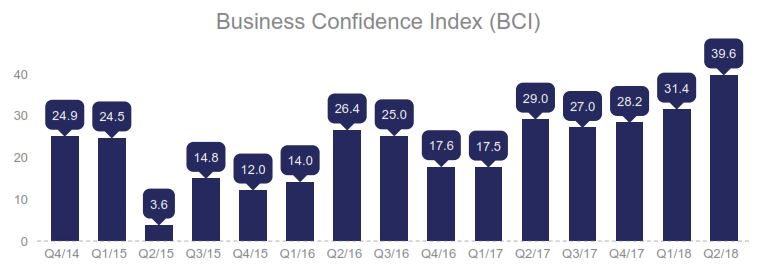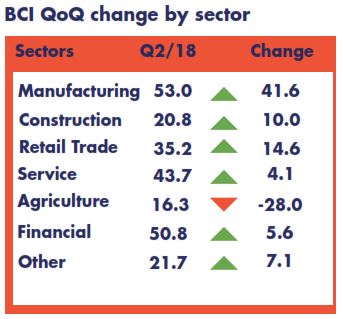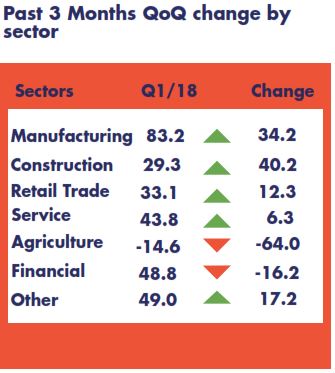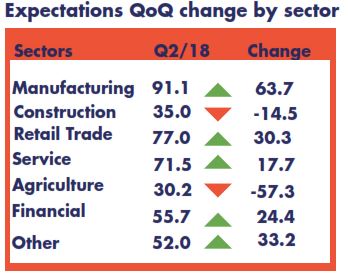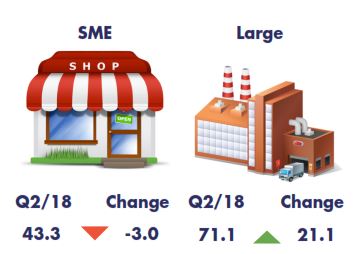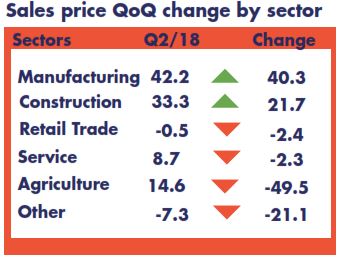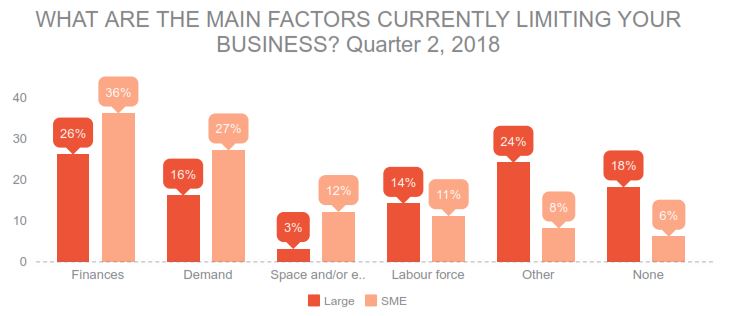Manufacture in Georgia!
ISET Business Confidence Index
Overall, the BCI gained 8.3 points compared to Q1 2018. Expectations in the private sector in Georgia increased significantly, by 18.1 percentage points, and reached 67.0 index points (up from 48.9 points in Q1). Business performance over the past three months increased, reaching nearly 41.6 points (increasing from 35.1), indicating an upturn in production/turnover/sales. The synergy of improved performance in the past three months and higher expectations have led to a raise in overall BCI.
The BCI index increased in all sectors except agriculture: manufacturing (+41.6), retail trade (+14.6), construction (+10.0), financial (+2.6), service (+4.1) and other (+7.1). The agriculture sector worsened by -28.0 points.
Past performance
Businesses’ actual performance increased significantly compared to the first quarter of 2018. In the Q2 2018 reporting period, sales (production or turnover) of the 236 firms surveyed increased from 35.1 (Q1 2018) to 41.6 (Q2 2018).
A significant increase in performance was observed almost in all sectors: construction (+40.2), manufacturing (+34.2), retail trade (+12.3), service (+6.3) and others (+17.2). Significant improvement means that in these sectors, the weighted balance between positive and negative responses decreased compared to the previous quarter. In the agriculture and financial sectors, production/turnover/sales for the past three months worsened by -64.0 and -16.2 points, respectively.
Compared to the previous quarter, a lower share of surveyed firms (57%) stated that employment remained the same over the past three months. More businesses reported an increase and fewer decrease in employment.
Moreover, 42% of firms claimed that their business activities remained unchanged over the past three months, while 36% of participants stated that they had improved their performance, and 22% stated the decline.
Expectations
The Expectations Index increased by 18.1 index points in the second quarter of 2018. Expectations about the next three months improved almost in all sectors, except agriculture (-57.3) and construction (-14.5). The highest increase was reported in the manufacturing and retail trade sectors (see the table).
As one can see from the table below, business expectations for the three-month period April through June 2018 increased for large size and decreased for SMEs firms.
The majority (58%) of surveyed businesses do not expect any changes in employment over the next three months. Furthermore, 33% of firms stated that they would employ more employees in the future. Meanwhile, 57% of the surveyed firms expected that the economic condition of their businesses would improve over the next three months, and 35% did not expect any changes in the future, while a lower share of businesses expect their business conditions to worsen.
Sales Prices Expectations
The Sale Price Expectation Index increased from 11.2 points (Q1 2018) to 11.7 points (Q2 2018). The increase in the Index is driven by significant improvement in the manufacturing and construction sectors. The agriculture sector's sales price expectations decreased the most, by -49.5 points. The manufacturing sector expects a noticeable increase in prices over the next three months. (for more information, see Table).
The overall Sales Price Expectations Index increased for large companies and decreased for SMEs. The majority (72%) of all surveyed firms are not going to change the prices they charge over the next three months. Only 7% of firms expect to decrease prices, and 21% expect to increase prices in the future.
Limiting Factors
A low level of consumption activities and lack of access to financing continue to be two of the most significant obstacles for businesses. From a total of 236 firms participating in the survey, 26% of large sized firms and 36% of SMEs noted that lack of access to finance was their main obstacle. Meanwhile, 16% of large firms and 27% of SMEs chose lack of demand as the main limiting factor for further business development.
Methodology
The ISET Policy Institute, working in partnership with the International Chamber of Commerce in Georgia (ICC), implemented the Business Confidence Survey in December 2013, and publishes the Business Confidence Index (BCI) on a quarterly basis.
Confidence is measured through a simple survey instrument targeted at top business executives. The survey is online. Answers obtained from the surveys are aggregated in the form of “balances.” Balances are constructed as the difference between the percentage of respondents giving positive and negative replies.
The methodology for compiling the indices is based on the Joint Harmonised EU Programme of Business and Consumer Surveys.












